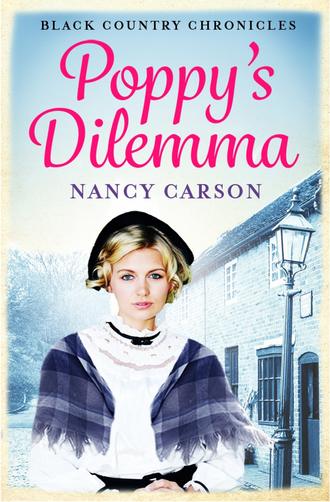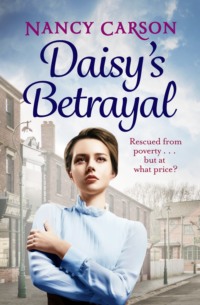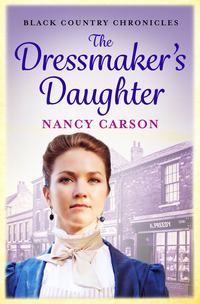
Полная версия
Poppy’s Dilemma
Poppy had consumed two half pints of beer and the effect of the alcohol was making her drowsy. The drone of the women’s voices became indistinct and in no time she was dreaming of Luke and his unexpected chivalry. She did not know how long she had been sleeping when she was awakened by the urgent shouts of agitated men and the sudden, alarmed crying of one of the children. Poppy raised her head off her pillow and tried to understand what was happening in the darkness. A lamp flared into life. Men were gathered in the open doorway, and her mother looked anxious as she stood at the bedroom door.
‘What’s the matter?’ Poppy asked as she rubbed her eyes.
‘They’ve got your father.’
‘Who’s got me father?’
‘The night watch. He’s in the lock-up in Dudley.’
‘Why, what’s he done?’
One of the navvies answered. ‘Nothing, as far as we can tell. A packman come in the public house selling baubles. Your father asked to see one and the packman handed one to him. When he asked for it back, Lightning Jack said somebody else had took it to have a look. But he accused Lightning of pinching it.’
Poppy looked with bewilderment at her mother, then at the navvy. ‘And had he pinched it?’
‘Nay,’ he answered. ‘Oh, somebody did, but I don’t reckon it was yer dad. He just passed it to somebody who asked to see it. Any road, the packman went out and the next thing we knowed, the police was there. The men am up in arms, and in the right mood. There’s gunna be trouble aplenty.’
Poppy quickly got dressed. Already she could hear the shouts from an army of angry men outside. Because they were navvies, they were regarded by those who didn’t know and understand their isolated way of life as the absolute dregs of society. Well, the navvies knew and understood their own way of life well enough and they stood together nobly, especially when one of their number was locked up for supposedly committing some felony of which he was innocent. The news had quickly spread. Those navvies who lodged in houses close by had been knocked up from their beds. They answered the call as well and joined those from the encampment, grabbing whatever they could that would serve as a weapon. It was time to set the record straight.
Poppy ran outside. Every man from the encampment still capable of standing must have been there. The ringleader was a ganger she knew only as ‘Billygoat Bob’. In the darkness, she could see that he was standing on a box as he incited the men with his ranting about injustice and bigotry. For the benefit of men who had been drinking elsewhere, he was explaining what had happened at The Wheatsheaf.
‘Nobody thought anythin’ on it, till the packman come back to the Grin and Bear It half an hour later with three bobbies. They came in like three devils, clouting everybody wi’ their blasted copper-sticks. The damned packman pointed out Lightning Jack and Dover Joe, so they dragged ’em out and chucked ’em in the Black Maria. Afore we knew what had hit us, they was away.’
The men were sufficiently inebriated to accept with fiery enthusiasm his tirades on the police and on the packman, which fed their lust for revenge.
‘If any one of you was in trouble, would ye not look to we, your own kind, to help yer in yer travail?’ Billygoat yelled over the hubbub, and there was a thunderous response of accord. ‘Well, Lightnin’ Jack and Dover Joe am innocent, but they’m in that stinkin’ gaol. It’s up to we to fetch ’em out afore they come before the beak and get sentenced. If we fail, they’ll end up doing penal servitude in Australia – that wilderness on the other side o’ the world … And they’ve both got women and families … It could have been you dragged out of that public house, mates. It could have been any one of you …’
A raucous jeer rang ominously through the night and a forest of arms shot up, most wielding pickaxe handles, shovels or hedge-bills. Billygoat stepped off his wooden box and led the incensed army away from the compound and up the hill towards Dudley. One or two stumbled and fell in their drunkenness, but they got up or were helped to their feet by mates bent on avenging this savage oppression.
Poppy followed behind. She had a vested interest. The other women, however, keen to witness some action, were caught up in the fervour of the moment as they hurried to keep up with the men, forming a separate, more passive group. The ragtag army fell more or less into step as they slogged on. Poppy had no idea of the time, but the streets were deserted except for the horde. They strode through the sleeping town, led by Billygoat Bob and those who knew the way, having deliberately followed the Black Maria which carried their comrades to the lock-up.
The two-hundred-strong mob reached the police station in Priory Street, a castellated, red-brick building with a mock portcullis through which they teemed. Hearing the commotion, the two policemen that were on duty presented themselves at the door on the other side of the yard that had rapidly filled up with the ranting crowd. One of the constables asked what the trouble was.
‘We want our two mates, Lightning Jack and Dover Joe,’ Billygoat Bob replied, with all the aplomb of a victorious army general negotiating a surrender. ‘They’ve been locked up for pinchin’ trinkets, but they took nothing. They’m innocent.’
‘Not according to what I’ve been told,’ the policeman said defiantly.
‘Then what you’ve bin told is a pack o’ lies. Some of these men here was in that public house, and they’d swear on their lives that them two men you’m holding had sod-all to do with any theft. Have you found the evidence on ’em?’
‘No, but they could’ve jettisoned that when they saw the arresting officers arrive.’
‘No evidence, eh?’ Billygoat called, loud enough for the throng to hear. ‘No evidence!’ He turned back to the policeman. ‘It strikes me as you should let ’em go, if you got no evidence.’
‘That ain’t up to me,’ the policeman said. ‘There’s nothing I can do. They’ll appear afore the magistrate tomorrow and he’ll decide what should happen to ’em. I’m just doing me duty.’
Billygoat turned to his men. ‘You heard what the constable said,’ he shouted. ‘He’s got no evidence, but there’s nothing he can do about it. There’s nothing he can do for us or our mates inside. He’s just doing his duty. Well, men … we have a duty as well …’
A roar of assent went up and the men surged forward in a mass. The policemen, realising that it was impossible to stand in the way of the mob and live, stood aside while the navvies poured into the police station. Inside, huge muscle-bound men wrenched open doors, pulling some off hinges, until one group came across the cells. Another policeman was on duty there. One of the mob asked him to unlock the padlock and set the prisoners free or be killed. Bravely, he refused. Acknowledging his courage and application to duty, Billygoat gave the order to leave him be. They would wrench the cell door down with physical force.
It took no more than five minutes. The two prisoners were helped out, to broad grins and triumphal cheers.
* * *
As the triumphant navvies and their women lurched back to the encampment, they dispersed into smaller groups. Poppy had gone up to her father as soon as she could get close to him and asked him if he really was innocent of the accusations levelled against him.
‘I’m innocent, my wench,’ he answered, ‘but I doubt the law will ever regard me as innocent. I had a necklace in me hand, I admit it – I was gunna buy it for you, my flower – but somebody snatched it from me and I don’t know who … Where’s your mother?’
‘She stayed with the kids.’
‘Good … I’m glad.’
‘You look worried, Dad …’
‘If I do, it’s ’cause we ain’t heard the last o’ this.’
‘What do you mean?’
‘What I say. The line will be crawling wi’ police tomorrer. They’ll never be able to let us navvies get off scot-free. They’ll never let us get away with this.’
They walked on together, silently considering the implications, and Poppy was touched that her father had been about to buy her a necklace. A few of the men were singing lewd songs as they trudged drunkenly homewards. Then, as the various clusters of navvies and women lumbered down Vicar Street towards Blowers Green, Poppy was aware of somebody else at her side and turned to see who it was.
‘What’s goin’ on, Poppy?’
‘Minnie! Where did you spring from?’
‘From that alleyway.’ She pointed over her shoulder. ‘I was with that Tom. So what’s up?’
Poppy told her, then asked what she was doing out so late.
‘That Tom,’ Minnie whispered behind her hand, rolling her eyes self-consciously. ‘He’s a bit of a buck. We was having it against the wall in that alley when we heard this commotion and saw all the navvies marching towards the town. I knew Dog Meat would be among ’em, so I thought it was a good time to leave Tom and get back in bed afore Dog Meat got back. Anyway, at that, Tom says, “Hey, I ain’t finished yet,” so we settled back to doin’ it again. It took longer than I thought …’ Minnie giggled unashamedly. ‘So if Dog Meat ever asks, I was with you on the way up to the gaol, as well as on the way back. I’ve bin with you all night. All right?’
Poppy chuckled. ‘You’re a crafty one, Min, and no two ways. Are you seein’ him again, this Tom?’
‘Who knows? I might. He’s worthy.’
Sheba, who had waited up anxiously for news of Lightning Jack, was overjoyed when he returned to Rose Cottage. She took his arm with concern and drew him to her proprietorially as he entered the hut.
‘Are you hurt, Jack?’ she asked, with sympathy in her eyes. ‘Did the police hurt you?’
‘I copped a clout across the shoulder, but I daresay it’s only bruised. Nothing to fret about.’
‘Oh, Jack, I was that worried. Thank God you’m all right.’
‘Aye, I’m all right, my wench. But I’m famished. Get me summat t’ate.’
‘There’s some bread and cheese.’
‘That’ll do.’
Two loaves of bread stood on the table in the communal living room. Sheba cut a hunk off one and handed it to Lightning with an ample lump of cheese. She poured him a glass of beer from the barrel, and treated herself to a smaller one.
While her father ate his supper, Poppy returned to the bed she shared. As she slid between the sheets, her sisters and brother roused but did not wake. Before long, her father and mother came in, carrying an oil lamp. Lightning Jack had sobered up following his experience in the gaol and was conducting a whispered conversation with Sheba. Then he blew out the flame and clambered into the adjacent bed, followed by Sheba. Poppy heard their stifled grunts and the squeaks of the iron bedstead as they performed their inevitable horizontal exercise. In the adjoining dormitory, the navvies who lodged with them clumped about as they stumbled over each other and swore profusely before they settled down. Poppy pulled the pillow over her head to shut out the various violations of her peace and tried to drift off to sleep, to the accompaniment of her own imaginings. It had been an eventful night.
Chapter 2
Morning came. Sheba and Lightning were up and dressed by the time Poppy awoke. Lightning was tying his clothes up in a bundle and Sheba was regarding him fretfully.
‘I’ll be back as soon as it’s safe,’ Poppy heard him say.
Alarmed, she sat up in bed and called, ‘Where you goin’, Dad?’
‘I’m goin’ on tramp, my wench. The police’ll be swarmin’ round this place like flies round shit, afore you can catch your breath. If they find me they’ll arrest me again. I’m gunna mek meself scarce. In the meantime, I’ll find work on another railway. The bobbies won’t know where I’ve gone and they won’t send men everywhere just to look for me. I’ll either send for yer all or, if the job’s no good, I’ll come back when the dust has settled.’
‘Will Dover Joe go with you, Dad?’
‘He’ll leave here if he’s got any sense, I reckon. But it’ll be best if we don’t go together.’
‘Oh, Dad, I shall miss you,’ Poppy declared with a flush of tenderness for this man, who protected her from the perils and coarseness of living among so many uncultured men. ‘Come back as soon as you can.’
He smiled, but sadness showed in his eyes as he ruffled her wayward fair hair. ‘I’ll be back for you, my flower. I’ll be back for you all. Have no doubt.’
‘You’d best be back soon an’ all, Jack,’ Sheba said. ‘Else we shall be turned out o’ this shant as sure as night follows day. Don’t forget as it’s owned by the contractors. Don’t forget we’re only tenant landlords, and that if you ain’t workin’ for the contractor we’ve got no rights being here.’
‘Ask Dandy Punch to cover for us,’ Lightning said. ‘He might ask a favour in return, but that’s fair enough.’ He arched an eyebrow, giving Sheba a knowing look.
Dandy Punch was the timekeeper. Poppy did not like Dandy Punch.
‘Tell him I’ll repay him handsomely as well for his trouble when I get back. Do whatever you think’s necessary, Sheba.’
Lightning kissed each of his children, gave Poppy a squeeze and clung to Sheba for a few seconds in a parting embrace. Then Poppy watched him turn around and walk out of the hut. Outside, he fastened a length of rope to various points on his wheelbarrow, creating a harness by which he could carry the thing on his back. He picked up his shovel, his pickaxe and his long drills, and tied them together and carried them on his shoulder like a soldier would a rifle. He threw his bundle of clothes over his other shoulder; a stone jar full of beer hung from that. Sheba handed him his straw bag, called a pantry, which held food to sustain him for a day or two. Then, heavily laden, he walked away from them, kicking up the dust as he went.
Poppy imagined that he had not turned around to wave lest they should see tears in his eyes. More likely, he would have seen theirs and, seeing them, might have been tempted to stay. But he could not stay. To stay might mean transportation. Transportation meant she would never see him again.
Through a haze of tears, Poppy watched him go. Lightning was a big man, tall and muscular. He was thirty-six years old, or so he believed, but because arduous work had taken its toll he looked nearer fifty. As a child, he had been a farm labourer in Cheshire. He had started work on the railways as a nipper, as a fat-boy greasing axles. Then, at twelve years old, on the construction of the Bolton and Leigh Railway, he’d been promoted to tipper boy, working with a horse and tip-truck, tipping the spoil from cuttings into wagons to be used subsequently as infill on embankments. After that, he worked on the Liverpool and Manchester till its completion. Lightning went back to farm labouring, but it could never offer enough, either in monetary terms or in excitement. So, when he heard about the starting of the London and Birmingham Railway, he tramped to the capital and worked the whole length of that line, starting as a bucket-steerer, but ending up as an excavator. Poppy recalled him telling her once how, at a place called the Kilsby Tunnel, he had witnessed three men, the worse for drink, fall to their deaths down a shaft as they tried to jump across its mouth, playing a game of follow-my-leader. When the London and Birmingham was finished, Lightning eventually joined the construction of Brunel’s Great Western Railway from London to Bristol with its controversial broad-gauge track.
Poppy turned to her mother, who was holding the youngest in her arms. ‘I wonder just how long it’ll be before we see him again.’ She had heard so many tales of men jacking up and going on tramp, leaving wives and families behind, never to be heard of again.
‘Within a month,’ Sheba replied with confidence. ‘Barring accidents. I know your father. He’s a man of his word.’
‘Tell me about how you came to be his woman, Mother.’
‘I was fourteen,’ Sheba said. ‘Two years younger than you are now. My own father was working on the London and Birmingham, but he’d gone off on tramp and left us. Lightning asked my mother if he could take me off her hands. She said yes, and he gave her a guinea for her trouble. She was glad of it as well.’ Sheba laughed as she recalled it. ‘That day we jumped the broomstick and the shovel together – the nearest a navvy ever gets to being proper wed – and that night I slept in his bed.’
‘But did you like him, Mother?’
‘Oh, I liked him well enough. He was strong and handsome with his long curls and drooping moustaches, and yet kind and gentle – not like some of them rough buggers. I caught straight away with you, our Poppy, and I had you when I’d just turned fifteen.’
‘I don’t know if I want to be a navvy’s woman, Mother,’ Poppy said, almost apologetically. ‘I reckon there’s a better life to be had.’
Sheba laughed and sat down, unbuttoning her dress to feed the baby. ‘Oh, there’s a better life, I daresay, but I wouldn’t know where to find it. This life is hard, though, tramping from one end of the country to the other, sleeping rough, just looking for work. I have to admit, no change could ever be a change for the worse. But getting away from it is another matter. Lord knows, everybody shies away from us as if we’re lepers when they know we’re navvies’ women. And yet a good many are glad to become navvies’ women – you only have to look how many wenches the single men pick up from the towns.’
‘Last night, me and Min went up into Dudley town,’ Poppy said. ‘We looked in the shops. They was full of stuff – beautiful stuff – shoes, frocks, coats, furniture, pots and pans, lovely crockery. And you should have seen how some of the women was dressed … the men as well …’
‘The shops in Dudley don’t do truck, do they? With no money coming in now, how am we supposed to get food and clothing except by truck?’
‘But that’s what I mean, Mother. If we didn’t have to rely on truck we could have what we wanted.’
‘Then you’d best find a feller who don’t drink every penny away in a couple of days, like your father does,’ Sheba said. ‘Somebody who won’t expect you to live on truck for the rest of the time, like most of ’em do.’
‘Yes, that’s what I’m saying, Mother. I don’t want to end up with a man that lives like that. So I don’t want to end up with a navvy. I want a house of my own. I want to sit in front of me own fireplace with a good husband and me kids safe abed upstairs.’
‘Dreams, our Poppy. And easier said than done. Any road, somebody’s already asked if he can have you.’
‘Who?’ Poppy asked with alarm.
‘Never mind. Your father wouldn’t agree to it.’
The rest of the hut’s occupants were stirring. Poppy heard the coughs and groans of men emerging from sleep with thick heads and wondered if it had been one of them that had asked for her. Through the thin partition she could hear the robust breaking of wind, followed by puerile laughter from those who thought it funny, and strings of abuse from those who considered the ensuing stink an intrusion. Somebody stepped outside and, through the small window, she glimpsed Tweedle Beak – so called because of his beaked nose – his back towards her, urinating into a patch of grass. Poppy was maybe the richer for having experienced this life, for nothing shocked her.
‘Shall we have some breakfast?’ she suggested. ‘Then I’ll scrub the floor.’
‘There’s plenty bread and cheese,’ Sheba said. ‘I’ll get some eggs today and some bacon.’
‘Did Father leave you any money then?’
‘About ten shillings. But I’ll have money from the beer we sell as well, and from the beds.’
Something else caught Poppy’s eye through the window. Towards the turnpike road she saw about a dozen policemen assembled, standing alongside a Black Maria and four horses. One of the policemen was clearly giving instructions to the others. Another man in a tall hat, a gentleman by his bearing, accompanied them. Her father had been right.
‘The police have come,’ Poppy warned her mother.
‘Let ’em come. They’ll not find my Lightning Jack here. He left just in time.’
The navvies lodging in the same hut grew strangely quiet; the irreverence and laughter were suspended, pending the intrusion of the police, whom they had evidently also seen. One thing was certain, however: if any of them knew anything about the missing trinkets, they were not about to confess it.
Soon they heard a loud rap at the door and it flew rudely open. A policeman was standing there with a young official employed by Treadwell’s, the contractors. Sheba withdrew the child from her breast and buttoned herself up, indignant at the interruption.
‘Are “excuse me” two words you’ve never heard of?’ she asked sarcastically. ‘Is there something you want of me, since you feel entitled to barge into my house?’
‘Good morning, ma’am,’ the police officer said, failing to sound deferential. ‘We are looking for two men who live in these barracks. They gave their names as Jack Silk, better known as “Lightning Jack”, and Joseph Wright, who is also known as “Dover Joe”. I suspect you know why we want them.’
‘You can suspect all you like, but there’s no Jack Silk here,’ Sheba said coldly. ‘Nor no Joseph Wright either. But if you want to check for yourselves, I won’t be able to stop you.’
‘I’m told Lightning Jack lives here.’
‘He used to,’ she responded defiantly. ‘But, thanks to you damned lot, he’s jacked and left us. Lord knows when we shall see him again – if we ever will.’
‘He should’ve thought of that afore he committed the crime,’ the policeman said, and nodded to the contractor’s man, who was young and handsome, and vaguely familiar to both Sheba and Poppy. Both men stepped inside the hut. The young man doffed his hat respectfully, but the policeman did not. Poppy appreciated this little demonstration of good manners from the young man and rewarded him with a brief smile, which he returned.
‘They’ve committed no crime,’ Sheba retorted. ‘It’s the packman’s word against theirs, but it suits you better to believe the packman, eh? Nobody ever believes there’s any good in a navvy.’
The policeman ignored her jibe, pulling sheets and blankets off the beds. He bent down to look under them.
‘Who’s in the next room?’
‘Lodgers,’ Sheba replied. ‘The men you’re looking for ain’t there either.’
The policeman opened the door and was greeted by eight surly, unshaven men leaning against their disorderly bunks. A birdcage with a tweeting canary hung from one beam; pairs of boots tied together and bags of kit hung from others. The constable spoke to the men and got several grunts in response as they shifted in turn so that he could search through the bedding. A small dog yapped from under a blanket, indignant at being so rudely disturbed.
The policeman turned to the contractor’s man. ‘Mr Crawford, do you recognise any of these men as the prisoners who were sprung last night?’
Mr Crawford shook his head solemnly.
The policeman then addressed the men. ‘Do any of you know where these two men, known to you as Lightning Jack and Dover Joe, might be hiding?’
All shook their heads and looked suitably solemn.
‘Well, we shall find ’em. Be sure of it. And woe betide ’em when we do.’
This encroachment on the navvies’ early morning routines as they prepared for work was not being well-received in other areas. Many had gathered together in the centre of the encampment and were muttering their dissatisfaction to each other. More joined them and the atmosphere thickened with a menacing air of belligerence. The policemen regrouped, truncheons drawn, the law firmly on their side, watching defiantly, until a lump of wood tossed from somewhere among the navvies hit one of them on the chest.
The older person, who was dressed in the top hat like a gentleman, moved to the front at once and shouted to make himself heard. He announced himself as a magistrate and told the men that unless they dispersed immediately and went about their business, the consequences for each of them would be serious. They must back off. Nothing was to be gained. The men the law was seeking had given them the slip. Why provoke more trouble?







